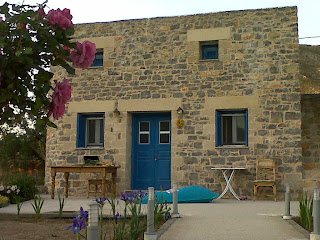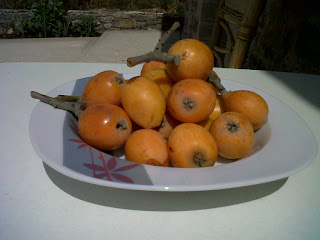Walking that deceptively undulating road is easier than cycling, even though it takes a little longer. I stop to watch birds circling very high around a spot just before the halfway point, hunting.
As I enter the town I pass Trata restaurant and wish kali spera as usual to the man who’s cooking, the smell of the food makes me hungry for some meat, which I haven’t had much of lately, since the butcher is in Livadia and my kitchen is always plentifully stocked with vegetables and fruit (Pavlos brought me a huge papaya yesterday!) and eggs and cheese anyway. Suddenly, though, I NEED a pork gyros, juicy meat all crispy on the outside tucked into a soft pitta with tzatziki and salad. I haven't had one since I arrived. Time was, I'd live off gyros on holidays in Greece.
But Dimitris is cooking some special fish for dinner, so I resist.
Walking down to the sea, I see Vangelis sitting upstairs on his own in the ouzeri, and wave. Then I think, hang on, what’s the rush? And I go back and ask if I can join him for a bit.
It’s a beautiful location, looking out to the sea and the mountains, but cosy too. Vangelis’ son Nikos just opened it, and Vangelis says he already had a busy lunch crowd. In the summer, when the Greeks come, it should be good business. As Vangelis has told me before, the Greeks, especially those who live abroad, don’t look at the price when they order. And they like to order fish when they’re by the sea.
‘It’s exciting coming into town and seeing people,’ I tell him. ‘Some days I only talk to the donkeys!’ Of course I also chat with Pavlos, and sometimes with with Dimitris II, Tropicana Dimitris, my vegetable man at Eristos, who always shouts something about me being a good vegetarian when I arrive to buy my many kilos of oranges and tomatoes and zucchini.
Vangelis likes the idea that I talk to the donkeys. ‘These are not Tilos donkeys by your house, though – Tilos donkeys are smaller, and more’ - he searches to show me the colour – ‘not blue exactly…’
‘Grey?’ My neighbour donkeys are chocolate brown and furry, and they look all embarrassed when I catch them rolling in the dust.
‘Yes, grey. There are now not many original Tilos donkeys. One time, every family had a donkey. You know why?’
‘Ah, I think I do! Pavlos showed me the thing for the olives, the olive press, and said the donkey walked in a circle and pulled the stone around to make the oil…?’ Pavlos had finally asked the other day if I knew what that stone thing in the middle of the garden was. I’d assumed it was some sort of well but hadn’t understood the flat top.
‘Yes! And also, for the work in the fields, the donkeys bring back the fruits… But after the war, when the people leave Tilos, they kill the donkeys. They didn’t think… Now, one man he have two and he try to breed them. I remember right over the mountain there, you know Gera? Up on the top of the mountain was the OTE, the telephone station, and the man who worked there had a donkey to carry the diesel and the water up there to keep the telephone going. It was in fifty-eight, maybe.’
‘You have so many more stories – you’ll have to expand the book!’ Vangelis has written an account of life on the island sixty years ago, Tilos in the Past, which an Austrian friend translated into English for him and I helped to get printed up this spring. It’s already selling well.
‘I think maybe in the winter, yes, after the treatment, I would like to write something more. I think of things.’ He’s still got to get through another round of chemotherapy.
The wind’s picked up and Vangelis is cold and needs to go inside, while I need to dash off to meet Dimitris for dinner. He has filleted a fish called loutsos, ‘the Greek edition of barracuda’, and grills it so the skin lifts away and the flesh is lean, delicate and delicious. He serves it with tomato salad and crusty, cake-like freshly baked bread.
The wine I’ve bought at the last minute at the new shop around the corner, on the other hand, is atrociously bad, half sweet and half sour. Dimitris teaches me a new phrase, i sapouni halvas na to fas, ‘You’ll eat it whether it’s halva or soap’ – so we drink a bit; at least he can use it to make vinegar. He drives me home late, after we wander down to Kafe Ino and stand outside watching the sea while people come and go.
*
This afternoon, after gorging on papaya, I cycle to Ayios Antoni. I notice how pretty it looks, and sadly how much rubbish does get washed up on that beach. But what I love about Tilos is its wild, empty spaces – there aren’t rows of houses and the seafront isn’t lined with hotels, it’s just rocks and goats, mainly.
I meet Dimitris, leave my bike there and he drives us to Plaka, and of course he’s right about going there. It’s windy and rough at Ayios Antoni, but at Plaka it’s calm and peaceful, the only sound that of the peacocks in the park behind the beach. They make a squawk something between a crow and a yowling cat. It gives Plaka an otherworldly feeling, especially with its strange spiky aloe plants too. Though the hills are still incredibly green; the dry season is very late this year.
The sea is so clear, and I know that it’s just what I need to sort out my drowsiness after the late night. I take the mask and snorkel and see lots of beautiful fish, so many different ones; my favourite of the day being white with vertical chocolate brown stripes and a billowing yellow tail and fins. I go back in after less than half an hour as the water’s cold and my fingers are going numb; time to fall asleep on the hot sand. When Dimitris emerges, he’s holding aloft a beautiful, dead octopus. Another one bites the dust. That’s what I wrote to him when he emailed me a photo of the last one, which kept him guessing what his catch had to do with a Queen song. Sometimes he emails saying: today only two fishes, I am not lucky every day. Thankfully, some days the fishes win.
Cycling home, I stop to say hello to a bunch of piglets, gorgeous little things, all poking their noses out towards me hoping I have something for them, and the mother watching over them…
Maybe I feel less like that pork gyros now. Will I ever eat meat again?!
When I’m having a shower back at home, Pavlos and Maria come round after cleaning out the chickens. I come out to find Pavlos is watering all the flowers, while Maria deadheads them. She goes off to the car and brings me a handful of fresh eggs.








































